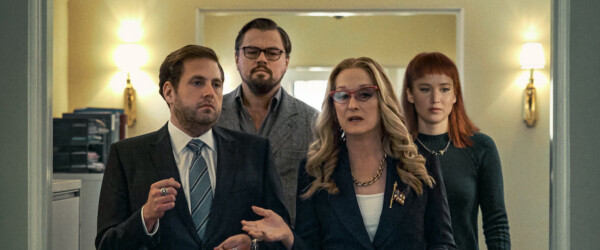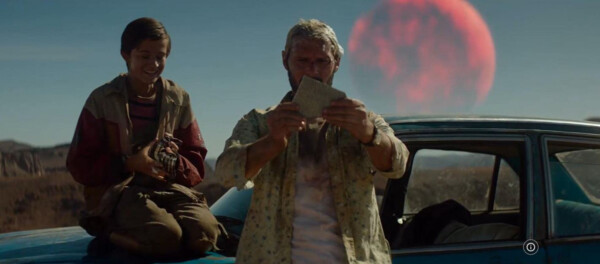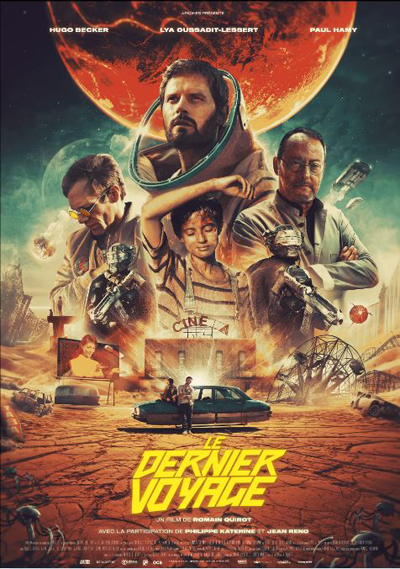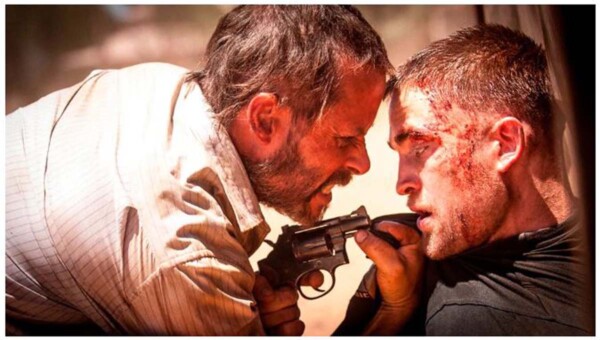Del reviews ‘Don’t Look Up’

Image courtesy of Netflix.
“Don’t Look Up” Starring Leonardo DiCaprio, Jennifer Lawrence, Meryl Streep, Cate Blanchett, Rob Morgan, Jonah Hill, Mark Rylance, Tyler Perry, Timothee Chalamet, Ron Pearlman, Ariana Grande, Kid Cudi and others. Directed by Adam McKay. Two hours, 18 minutes. Rated R. Netflix.
Del’s take
An existential threat is hurtling our way and what does the president of the United States want to do?
“Sit tight and assess,” decides President Orlean (Meryl Streep), who fears an approaching apocalypse might cost her party the midterm elections.
That’s the message of “Don’t Look Up,” a hilarious yet stinging denunciation of many things – our leadership’s response to the climate change crisis, the empty-headedness of American culture, the corrosive influence of social media and metrics, and the dehumanizing fist of runaway capitalism. It is the new “Idiocracy” and it arrives just in time to skewer all the people who deserve a sharp stick in the eye.
The story is about a milquetoast, Walter Mitty-style astronomer (Leonardo DiCaprio as Professor Randall Mindy) and his edgy PhD candidate assistant (Jennifer Lawrence as Kate Dibiasky) who discover a planet-killing comet that will smack Earth in six months. They discreetly sound the alarm only to discover the authorities, who don’t understand the science and don’t care, will not respond to the crisis unless it serves their interests. So Mindy and Dibiasky whistleblow the story to the media, where it lands with an apathetic thud. Most people are more invested in the breakup of two popular singers, Riley Bina (Ariana Grande) and DJ Chello (Kid Cudi). As doom becomes an undeniable reality the government staggers into action by entrusting the fate of the planet to a whackjob Elon Musk-style billionaire (Mark Rylance as Peter Isherwell), who wants to break up the comet into smaller pieces and let them collide with the Earth so the fragments can be mined – by his telecommunications company, Bash – for precious metals crucial to the manufacture of smart phones. All that’s left is negotiating with the countries to be annihilated over how much money they want for their dead.

“Don’t Look Up” offers more Oscar-fueled star power than a map of the Milky Way, and many of the performances are better than strong. DiCaprio as hapless Dr. Mindy channels a furious Howard Beale (Peter Finch in “Network”) when he finally revolts against the frustrating ennui of 21st century America, while Jennifer Lawrence effectively portrays the optimism of youth as it dashed against the rocks of the corrupt, self-serving inertia that serves as leadership these days. Meryl Streep evokes a dumb-as-a-box-of-rocks, Donald Trump-style president whose only strong suit is a kind of animal cunning, while Cate Blanchett, as the glib yet shallow peroxide blonde who leads Dr. Mindy astray and then abandons him when he becomes a liability, perfectly portrays the fickleness of American media.
A few other performances worth mentioning: Ariana Grande is a hilarious Riley Bina, as is Mark Rylance as Isherwell, which I suspect is a composite of Musk and Steve Jobs. And Jonah Hill as the juvenile White House chief of staff (and Orlean’s son) makes you want to reach through the screen and slap him. The one performance that left me cold was Timothee Chalamet’s Yule, though at one point he offers a prayer for the ages.
“Don’t Look Up” has gotten mixed reviews. Nick Allen of RogerEbert.com calls it “McKay’s worst film yet” while Charles Bramesco of The Guardian dismisses it as a “disaster.” The New York Times and CNN were more merciful. The complaint centers around the jokes and caricatures, which they say are lowbrow. I would argue that in an age where attention spans near a half-life of a nanosecond, the lack of “razor-sharp wit” is as much commentary as the jokes and characters themselves.
I enjoyed the hell out of “Don’t Look Up” and I thought it communicated exactly what the “Let’s Go Brandon” crowd needs to hear – that they’re a bunch of fucking idiots who are screwing up the country and the planet with their selfish ignorance. The fact that this message was delivered with a hammer, not a scalpel, is a strike in the movie’s favor. Do you seriously think people who believe vaccines are evil and Donald Trump is still the president would notice or respond to “razor sharp wit”? Give me a break.
Isherwell brags that his algorithms are so good they can predict when and how President Orlean will die. She will be eaten by a “bronteroc.”
I won’t tell you what that means. To find out you must watch past the credits. But it’s pretty damned funny.
Meanwhile, check out “Don’t Look Up.” Pay no heed to the critics – it’s funny as hell and I think you’ll enjoy it, unless you’re one of the people being skewered. And who knows? If you have a sense of humor, you too might get a laugh.
I rate it a solid A.
Del Stone Jr. is a former journalist and writer.

Image courtesy of Samuel Goldwyn Films.
—
“The Last Journey of Paul W.R.” Starring Hugo Becker, Lya Oussadit-Lessert, Paul Hamy and Jean Reno. Directed by Romain Quirot. 1 hour, 27 minutes. Unrated. Hulu.
Del’s take
“The Last Journey of Paul W.R.” is a visually arresting but spiritually obtuse commentary about many subjects, some personal, some cultural, some even scientific. But the viewer will decide if any of these arguments have merit and if the movie is as steeped in layers as it would have you believe.
Based on a short film by French director Romain Quirot, “The Last Journey of the Enigmatic Paul W.R.,” which premiered at the 2016 Tribeca Film Festival, “Journey” tells the story of Paul W.R. (Hugo Becker), who is the only man who can save the world.
In the near future, man’s meddling with climate and his despoiling of the environment have led to catastrophe. Rising temperatures caused by fossil fuels have transformed the earth into a desert hellscape. France now resembles Morocco, where “Journey” was actually filmed.
Salvation arrives in the guise of a planetoid called “the red moon,” which contains a mysterious substance, Lumina, a highly energetic mineral that promises to solve mankind’s energy crisis. Unfortunately, the mining of Lumina has provoked a hostile response, a powerful electromagnetic barrier that surrounds the red moon and sends it on a collision course with the Earth.

Only one man, Paul W.R., for reasons unspecified, can penetrate the electromagnetic barrier and destroy the red moon. But hours before he is due to begin his mission, Paul W.R. flees, hiding among the thousands of climate refugees that populate desert France. He connects with a disaffected teenage girl, Elma (Lya Oussadit-Lessert), and together they embark on a quest to find a forest Paul remembers from his childhood, one that may hold personal salvation.
Bound up in this hegira is Paul’s father, Henri W.R. (Jean Reno), who in the American style neglected his sons and his dying wife to ensure mankind’s access to Lumina, and Paul’s brother, Elliott W.R. (Paul Hamy), who attempted to pierce the red moon’s veil and failed, coming away from that near catastrophe with a psychic ability to compel suicides. Elliott is pursuing Paul, ostensibly to bring him back for his flight to the red moon. But it is obvious a degree of sibling rivalry may result in a different outcome.
The movie is visually beautiful. Quirot composes scenes the way a poet might arrange quatrains. But lost in the images of desert and firestorms is a sense of purpose as Quirot struggles to decide which imperative will drive his movie – the larger issue of mankind’s demise or the dysfunctional dynamics of Paul W.R.’s family. Add to this muddle the presence of Elma, clearly a symbol for innocence, and the red moon itself, which may be a metaphor for Paul W.R.’s late mother, and the result is a film going in several different directions, none of them working with the other.
“Journey” is a European movie – a French movie – though at times it does lean toward the American sensibility for gunplay and fistfights. In the end it becomes a commentary about the power of the individual, and how one must remain true to his or herself. Or perhaps not.
I give this movie a grade of C+. It has lofty ambitions and beautiful scenery, but its lack of focus means few will appreciate whatever it was Quirot tried to say.
Del Stone Jr. is a former journalist and author.

Image courtesy of Roadshow Films.
“The Rover” Starring Guy Pearce as Eric, Robert Pattinson as Rey, Scoot McNairy as Henry, and others. Directed by David Michod. 1 hour, 43 minutes. Rated R. Streaming on most major platforms except Netflix.
Plot summary: It’s the end of the world and Eric’s (Guy Pearce) car has been stolen. He wants it back and sets off to find the thieves. Along the way he encounters the brother of one of the thieves, Rey (Robert Pattinson), who says he knows where his brother Henry (Scott McNairy) is holed up. The two embark on an unlikely adventure across the post-apocalyptic Australian Outback, one in search of justice, the other in search of company.
Spoilers quotient: Low
Del’s grade: B
Mladen’s grade: A-
Del’s take
“The Rover” takes place in Australia, “10 years after the collapse.” I read that and thought, “Hot diggity, a new Mad Max movie.”
Alas, “The Rover” is no Mad Max. It’s one of those “long-stare” movies – you know, the kind where the characters perpetually stare into the distance, at times squinting, like me trying to read the fine print in my homeowner’s insurance policy. Those long stares should be accompanied by something Nietzschean – an abyss, a monster, just some expression of Teutonic fatalism. Alas, there is nothing, which means things have really gone downhill.
What we do get is blood, violence, and cynicism, which is not to say “The Rover” is a bad movie. For what it is, it’s pretty good. But if I want to give up on humanity I’ll watch the 6 o’clock news.
And that’s the thematic imperative of “The Rover” – people are scumbags and the world is for shit. The viewpoint character, Eric, sees people in one of two ways – expendable impediments, or means to an end.
That is until he meets Rey, brother of one of the trio who stole his car. Rey is simple-minded and as such, he functions as an archetype for mankind in its undiluted state, innocent and corruptible, the perfect Petri dish for Eric’s contagious cynicism. And that’s what Eric sets out to do – make Rey as hardhearted as he is. He calls it “learning to fight,” but it’s nothing more than learning not to give a shit about anyone but yourself.
It’s at this point we see a chink in Eric’s armor. As he watches Rey descend into scumbaggery he seems to regret what he’s done, a theme later reinforced by Henry, Rey’s brother, who screams at Eric, “What did you do to him?”
In the final scene we learn why Eric was hellbent on finding his car, offering yet another peek at his shredded humanity while simultaneously illustrating his decline into spiritual suicide. I was hoping for a gesture of redemption and I guess it could be seen that way. More likely it was a final middle finger to the human race.
Framed against the dusty wastes of the Australian Outback, “The Rover” delivers a more depressing statement about the nature of man than many other post-apocalyptic tomes. Everything in its universe is violent, bloody and cynical – in other words, what America will be when the Republicans get through with it.
“The Rover” was well made but it’s depressing as hell. Like I said, if I want a dose of bleakness I’ll watch the 6 o’clock news.

Mladen’s take
This is a chicken-or-egg question. Did the first John Wick movie release before “The Rover” or after? I ask because both films are 2014 cinema and both revolve around the plot point of a man, his car, and a dog, albeit under different conditions. For a moment, I wondered if “The Rover” was a riff on “John Wick” but I dismissed the idea for a couple of reasons. This allowed me to dwell on the austere beauty and simplicity of “The Rover.”
I empathize with the notion that a man’s car is his castle. Where Wick wanted his ’69 Ford Mustang returned, our “The Rover” anti-hero Eric wanted his stolen Holden Commodore back. The Commodore is a sleeper, clean ovoid lines with only its quad exhaust suggesting there are serious newtons – using horsepower to measure engine output is primitive – under the hood.
As Eric roves the Australian outback searching for his Commodore and the contents of its trunk, he finds Rey, the brother of one of the thugs who stole the Holden. Their unlikely partnership serves as the backbone of the movie, which unfolds per my motto in life, “Steady as she goes until you have to pull the trigger.”
Del complains that “The Rover” is a long-stare movie. Sure, in some instances. But you must always keep in mind that it’s staring straight at mankind’s future. And, it’s clear Del wasn’t paying attention when he wiggled his arthritic index finger back and forth at those moments in the movie when very little, if anything, was happening. The disquieting quiet in “The Rover” is backed by a terrific score. When Eric’s broken and nearly remorseless heart allows stoic calm, the score provides the heat.
The acting in “The Rover” is very good even when the script falters here and there. Pattinson as Rey is perfect. Del described Rey as simple-minded and the film’s Eric as a half-wit. Not the case. As it turned out, Rey had a hard time making decisions but, when he finally decided on a course of action, it was executed very effectively. Rey sure as hell had a keen instinct for survival.
“The Rover” is bleak. It is punctuated by violence. The way Eric concluded his first business-like transaction surprised the hell out of me. But, the movie’s atmosphere is plausible. Though the Collapse had occurred, some level of social organization was still present. The norm that killing people was bad still had some sway. The Australian government was trying to enforce laws. Cargo trains still ran. Food, water, and gas were available for the properly denominated payment.
I give “The Rover” an A-. There are a couple of notable bits of dialogue. The movie isn’t too long and, as I already mentioned, the acting is very good and the score top notch. The high rating, a portion of it anyway, might be an artifact of the trauma Del dropped on my head with the last two movies he had me watch. Compared to “Leave the World Behind” and “Saltburn,” the version of dystopia portrayed in “The Rover” seemed uplifting.
Mladen Rudman is a former journalist and technical writer. Del Stone Jr. is a former journalist and writer.